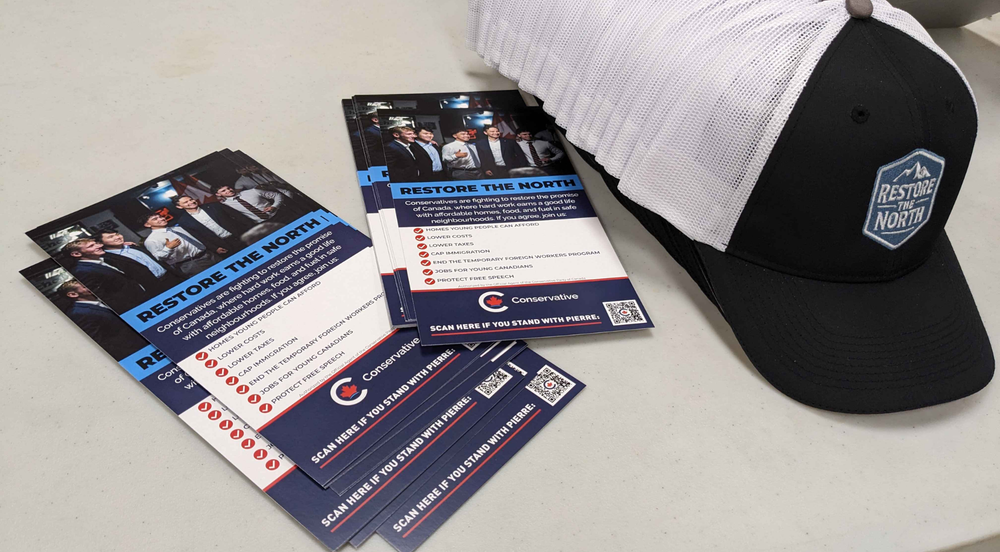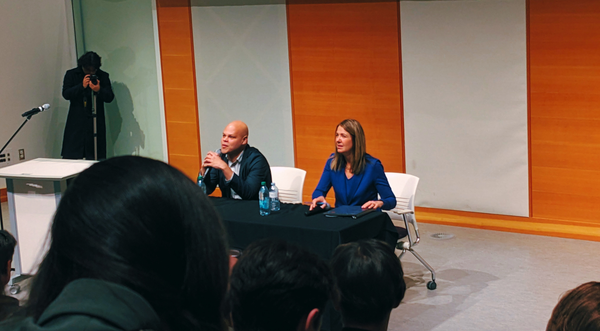ADAMS: Inside Jamil Jivani's Restore the North
When I walked into the “Restore the North” conference at TMU, I thought I knew exactly what kind of event I was stepping into. The stage setup, the cadence of the speakers, the branding, it all echoed the American college-tour model popularized by groups like Turning Point USA and figures like Jordan Peterson.
To be clear, I don't have a problem with that model in principle. I believe in debate, in putting ideas to the test. But what I do have a problem with is the bad-faith theatre that so often masquerades as discourse in those spaces.
I feel that Turning Point USA has inflicted damage on the Socratic art of debate. Their events have never been about genuine intellectual exchange. They are highly choreographed spectacles designed to generate viral clips: "debates" where unsuspecting students get ambushed with deceptive framing, pseudo-intellectual sleight of hand, and rhetorical traps so the organizers could walk away looking clever. This legacy is one of irreparable harm to the kind of debate I actually love.
That's why, when I walked in, I braced myself. The last Conservative Party event I attended was right before the election, and it was toxic in a way I won't soon forget. The shocking amount of racism directed at counter-protesters, the casual invocation of violence one supporter made against Mark Carney, was a lesson that the danger in radicalism is not always in the words on stage, but in the atmosphere that fills the room, and the people and talking points you allow into your spaces.
And since Restore the North” seemed cut from the same cloth, I expected more of the same.
…But what I encountered was something more complicated.
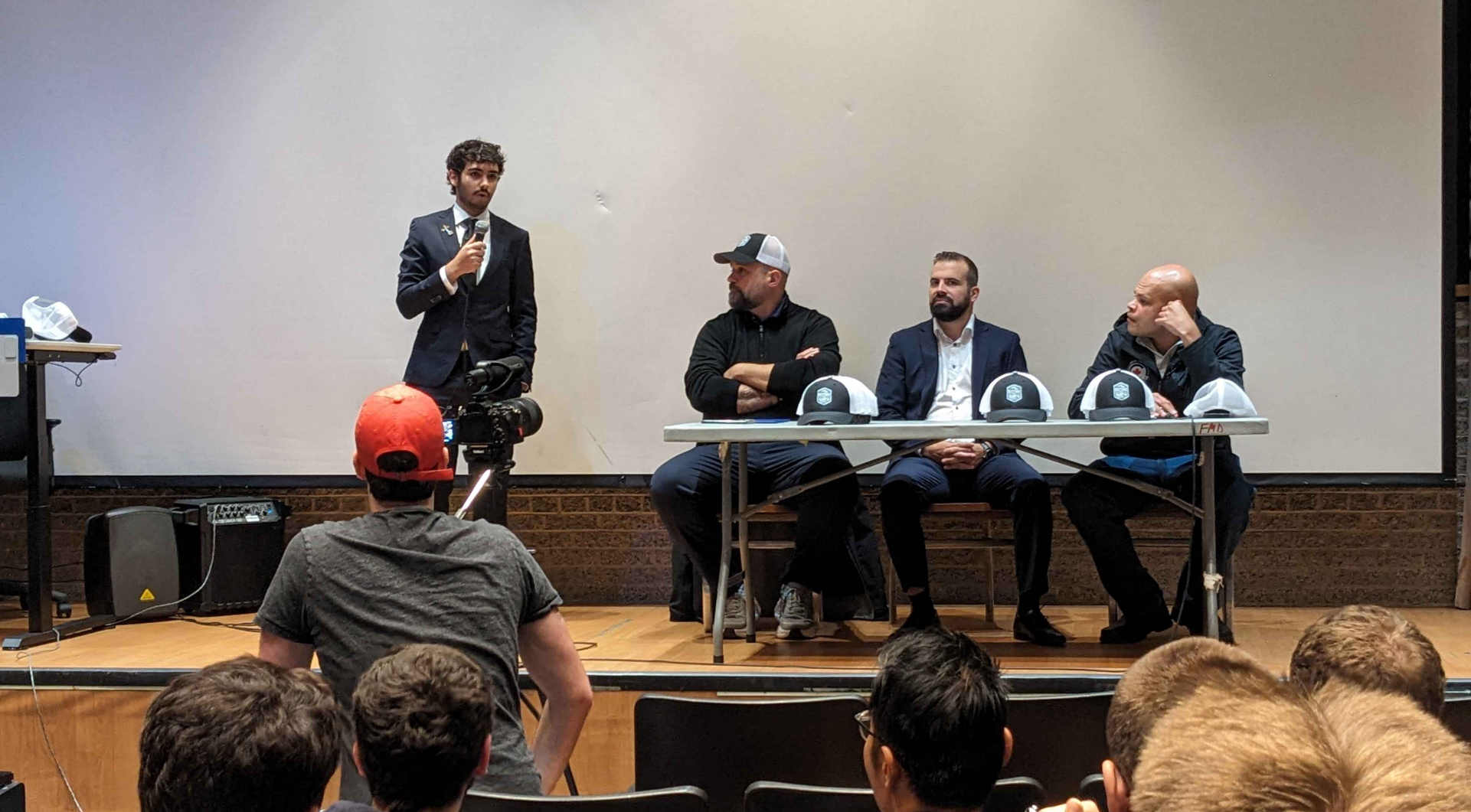
When the event kicked off, Jivani opened with a standard welcome to the audience, nothing unusual there. Then he moved into acknowledging the passing of Charlie Kirk. Now, to be clear, I am not at all shocked that Kirk was mentioned. His death was horrific, and it makes sense that someone in Jivani's political orbit would bring it up.
What did raise eyebrows, though, was the framing. Jivani spoke of Kirk as if his legacy was universally inspirational for young people who like the art of political debate, whether you see his legacy as positive or deeply controversial will do a lot of heavy lifting for that sentence, as Jivani completely glossed over the fact that, for many, that legacy is extremely controversial and not exactly the beacon of positive discourse he presented it as.
In the same breath, Jivani brought up Jordan Peterson's recent illness, almost as if pairing them in the same ideological memorial space.
The Tories Keep Picking the Losing Side of the Free Speech War
After that somber tribute, Jivani pivoted into two big, sweeping questions, the kind politicians love to ask because they sound profound without actually saying anything concrete:
“What does Restore the North mean to you?”
It was the kind of setup that wants to feel like the start of a grand movement, but without any clarity on what “restoration” means, who it benefits, or whether everyone is actually included in this version of the promise of Canada.
To Jivani, “restoring the promise of Canada” apparently comes down to restoring freedom of expression. And on paper, sure, that sounds great. Everyone likes free speech, right? The problem is that every time the Conservative Party of Canada has invoked “free speech” over the past decade, they somehow manage to always land on the wrong side of every single free speech debate in this country.
Even a quick look at the CPC's own website makes this painfully obvious.
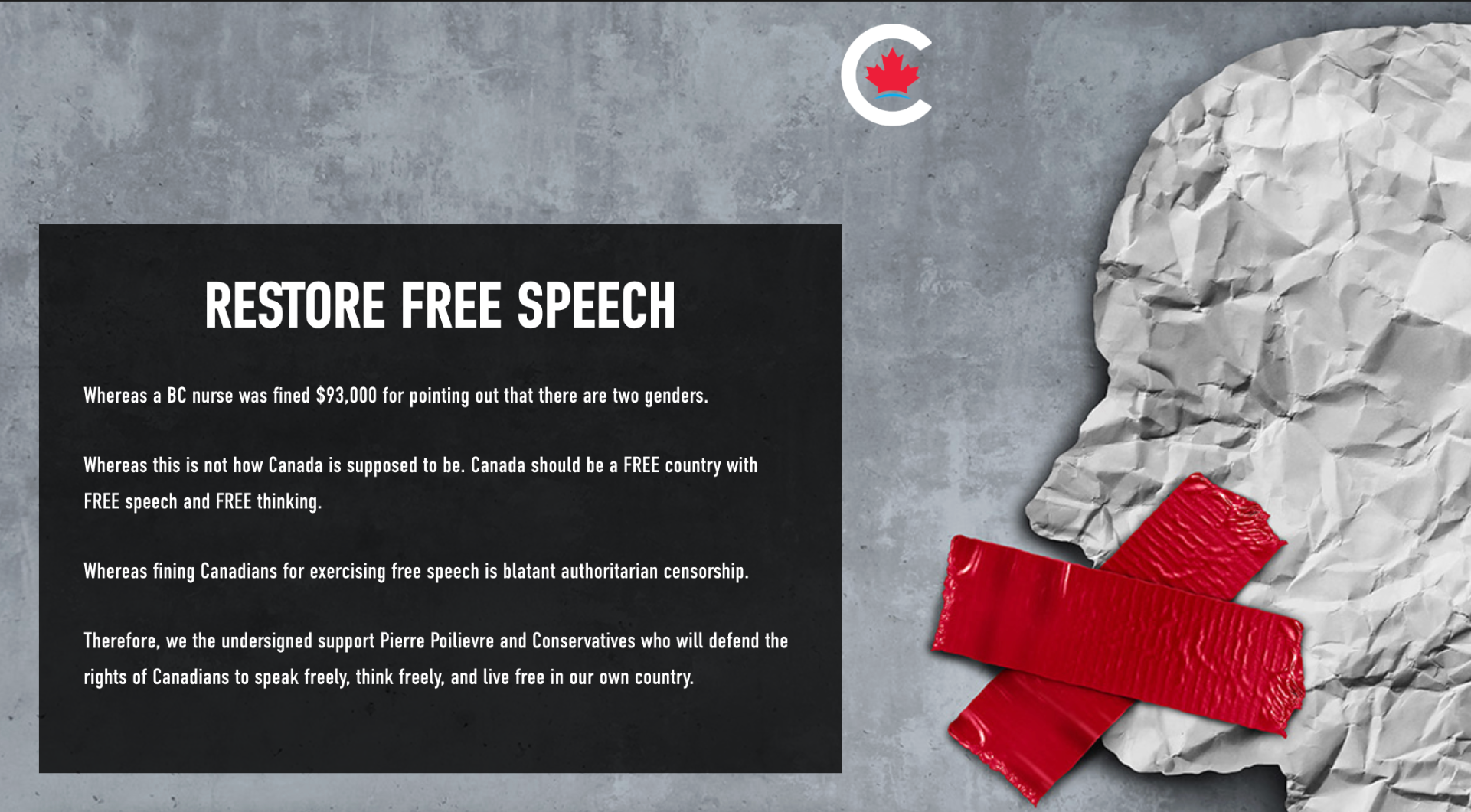
Their current example of “free speech under attack” is a BC nurse who was fined $93,000; if you read their telling of it, you would believe she was fined “for pointing out that there are two genders.”
That framing is so misleading it borders on fan fiction. what actually happened is she sued her employer and lost, because she was put on administrative leave after putting up an unprofessional, explicitly transphobic billboard that violated her contract. She was fined because she filed a lawsuit, lost, and had to pay costs.
It's a workplace professionalism and contract issue, not Orwell's 1984.
Before this, we had the previous Tory leader telling the Ryerson Young Conservatives that anyone who objected to his idea that "residential schools were designed to educate" take was just a “dumb lefty radical.” When people lost their jobs for even questioning Israel, the Tories declared that anyone scrutinizing taxpayer dollars going to a foreign government is automatically “anti-semitic.”
Now, does Jamil personally fall into that same hypocrisy? Honestly… I don't know yet. There are arguments in both directions. To his credit, he didn't just stack the event with Party establishment cronies. Instead, he invited newcomers Aaron Gunn and Ned Kuruk—both extremely controversial new MPs, and one of them arguably even more controversial than Jivani himself. So on the surface, that could signal a willingness to platform voices outside the party's sanitized bubble.
But, and this is important, something happened very early on that night, something that directly contradicts this pro–free speech image Jivani is selling. And trust me, we’re going to talk about that.
A Forum Without Follow-Ups
Something happened very early on that night, something that directly contradicts this pro–free speech image Jivani is selling. And trust me, we're going to talk about that.
Most of the questions from the audience were fair, thoughtful, and actually worth answering. But the responses? Gas. Red tape. Pipelines. Over and over again. Jivani, Gunn, and Kuruk never strayed from this basic formula. Instead of genuine engagement, attendees got prepackaged slogans lifted straight from campaign pamphlets, with no follow-through, no explanation, and no nuance. I also want to point out: you just can't solve every problem by building another pipeline. At some point, you've gotta bring something else to the table.
To be fair, there were a few questions with actual substance.
One person asked about multiculturalism. Hallelujah, an adult topic! And then Jivani immediately torpedoed the moment by getting the date of the Multiculturalism Act wrong by three years. He says “1985, I think,” and I swear, my soul left my body as I reflexively yelled “1988!” like I was correcting a contestant on a game show. I didn't do it to be rude, I just felt like a moral obligation to correct such an obvious factual error in real time.
More notably, a Poilievre supporter in attendance asked what I thought was the most actually relevant question of the entire night:
“How Conservatives can win over moderates who think Poilievre is Trump-adjacent and see him as a destabilizing choice?”
Instead of addressing the concern head-on, Gunn launched into this bizarre tangent about Mark Carney misleading people and implied he wouldn't win another election if one were held today. He sort of circled back to the real question, but only in that safe, PR-approved, “don't say anything that could be clipped against us later” kind of way.
The main problem with this event came down to how the panel responded to questions. Almost every answer sounded super rehearsed, with no follow-through, no explanation, and no nuance. And before anyone could request clarification or, heaven forbid, hold them accountable for the bad answers, we hit another wall:
Nobody was allowed a follow-up. One question per person. You ask, they (kind of) answer, and then you're done. That's it. No back-and-forth, no chance to challenge any vague non-answers, nothing. Combine that with the fact that recording video inside the event was strictly prohibited, you end up with a room full of people nodding along to noise instead of authentic debates that challenge the other persons point of view.
My question
When my turn came to take the mic, I began not with confrontation, but with recognition.
I spoke about how I like to look at the glass as half full. About how, despite my deep political disagreements with Jamil Jivani, I respect the democratic act of showing up and talking to people who don’t share your vision. I reminded him that I had volunteered for his opponents in both elections he ran in, that I am not part of his movement, but that I value dialogue as a cornerstone of civic life.
Then I asked my question, one rooted not in ideology but in arithmetic. I challenged his and Michelle Rempel Garner's call to abolish the Temporary Foreign Workers Program, pointing out that 7% of Canada’s 2024 workforce—roughly 1.5 million people—were temporary foreign workers.
Eliminating the program would mean removing a million and a half incomes, tax contributors, renters, and in some cases, employers, so I asked how he reconciles that reality with his stance. And to his credit, Jivani responded thoughtfully.
He began by addressing me, not my argument. He thanked me for coming, called me “authentic,” and noted that this exchange was in line with what he's come to expect of me in the time he's known me. A small moment, but a real one.
He then laid out his position clearly, tracing the program's evolution from its seasonal agricultural origins pre-1973 to its present form, arguing that it has drifted far from its initial purpose. He made the case that today's labour market means the program now displaces young Canadians from entry-level jobs and suppresses wages. In his view, it's a program that has overstayed its welcome.
Now, he did not address how the economic shock of removing a million and a half incomes from our economy could affect the country, that being the core of my argument. But he did elaborate on his reasoning with more substance than I expected, and crucially, he listened. His body language made that clear.
Jivani's politics are, in my view, fundamentally harmful. Despite this, I've met him many times in my community, and our conversations have always been marked by mutual recognition, even amid disagreement. This exchange was no different.
When I finished my question and Jivani gave his answer, the room broke into applause. Not the perfunctory kind, but real applause. Warm, sustained, second only to the night's biggest crowd reaction. When I sat back down the man in front of me leaned around and started whispering. He told me I'd asked a good question. and that he was glad I came out to offer my perspective.
I've seen him before at other events Jivani was present at; I do not know if he works for him, but he's clearly a Conservative. And yet, in that moment, political labels didn't set the terms of the interaction. He wasn't trying to score a point or trap me, he was just genuinely appreciative that I got up there.
For someone who had walked into that room expecting a bad-faith circus, this was unexpected. It didn't change my views, and it certainly didn't erase my criticisms of the Jivani's politics. But it was a reminder that even in spaces styled after the worst habits of American right-wing campus culture, genuine exchange is still possible. It was, in other words, a glass half full.
When the show ended
After the event wrapped, I found myself standing in the hallway for several minutes, fielding questions from reporters. TMU's student paper wanted to hear my thoughts, and so did Canadaland. I was more than happy to talk, I had come here to engage, after all. Canadaland actually mentioned me on air.
CNoor Azrieh addresses Will Adams' question to Jamil Jivani about the TFW program as “a pretty convincing argument.” Audio credit: CANADALAND
But not everyone was interested in listening. One woman, who I would later find on X, came up and immediately started it with me. She demanded to know why I voted Liberal and why anyone would. For the record, I never said I voted Liberal, only that I'd volunteered for Jivani's opponents. But that didn't matter to her. She had decided who I was the second she saw me.
She wasn't there to debate in good faith; she was there to trip me up, to make me look foolish. She mocked my views, my hair, hell, she mocked my hat—the one that reads “Canada is not for sale,” asking me why I would wear “such a ridiculous thing.” I told her; I'm a patriot, that I love this country, and will always be Canadian, never American. She rolled her eyes. On X, she constantly posts transphobic bile, so her reaction didn't surprise me. If anything, it was a perfect example of the very culture that keeps people like me from voting Conservative: the anti-LGBTQ hostility, the sneering dismissal of anyone outside their camp.
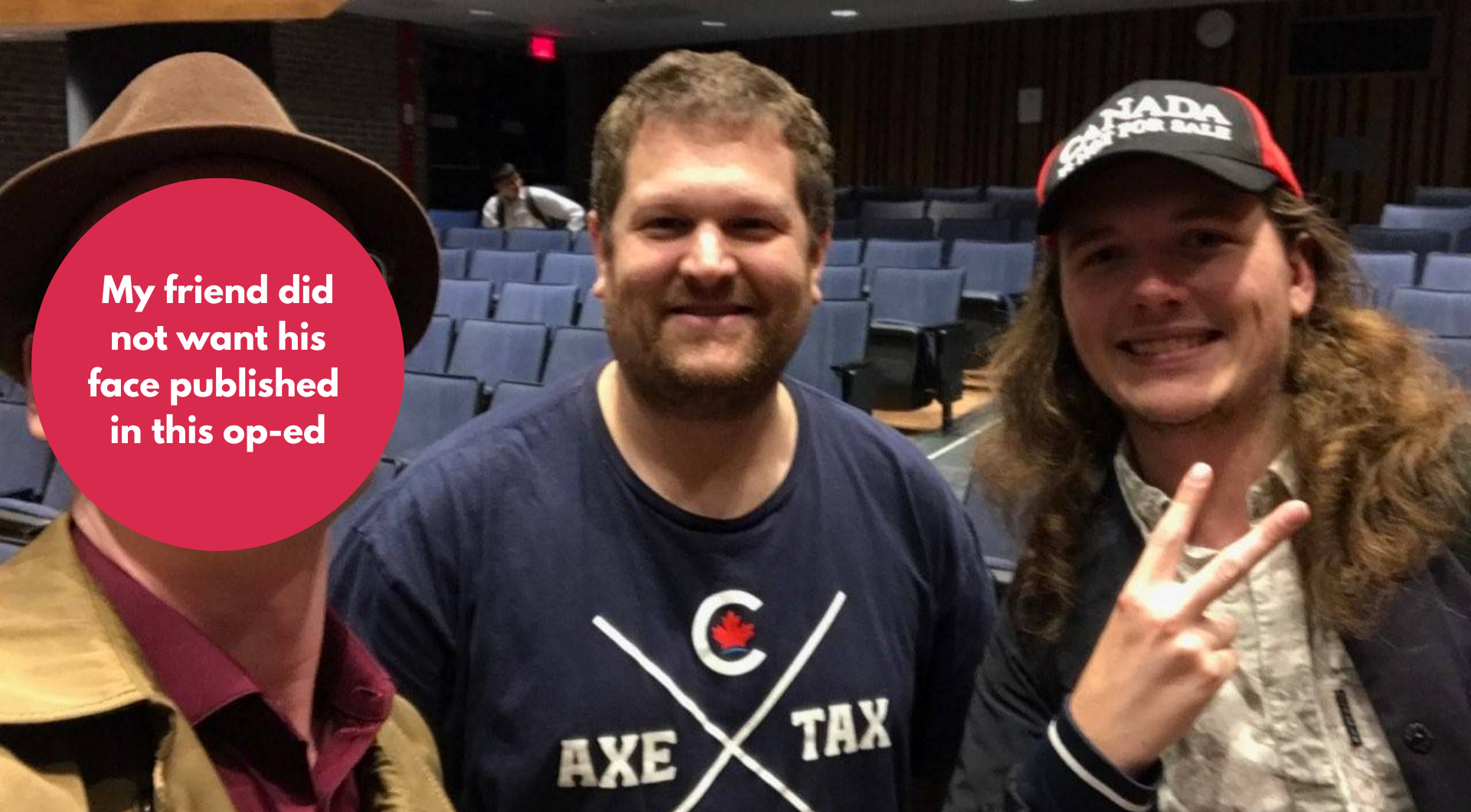
And yet, just a few feet away, a completely different interaction unfolded. A gentleman wearing an “Axe the Tax” shirt came up to talk to me and my entourage about my question. He disagreed with me, but instead of being judgemental, he actually listened. We talked for almost 20 minutes, and found common ground on a number of topics, including our mutual disdain for Doug Ford.
In that moment, I realized something important: the hostility I feared was real, but it isn't universal. For every person determined to see me as an enemy, there were others willing to meet me halfway. Many of the people I spoke with that night found some sliver of shared ground with me. Not because our politics suddenly aligned, but because we talked like human beings, not caricatures.
A Case Study in How Not to Energize Voters
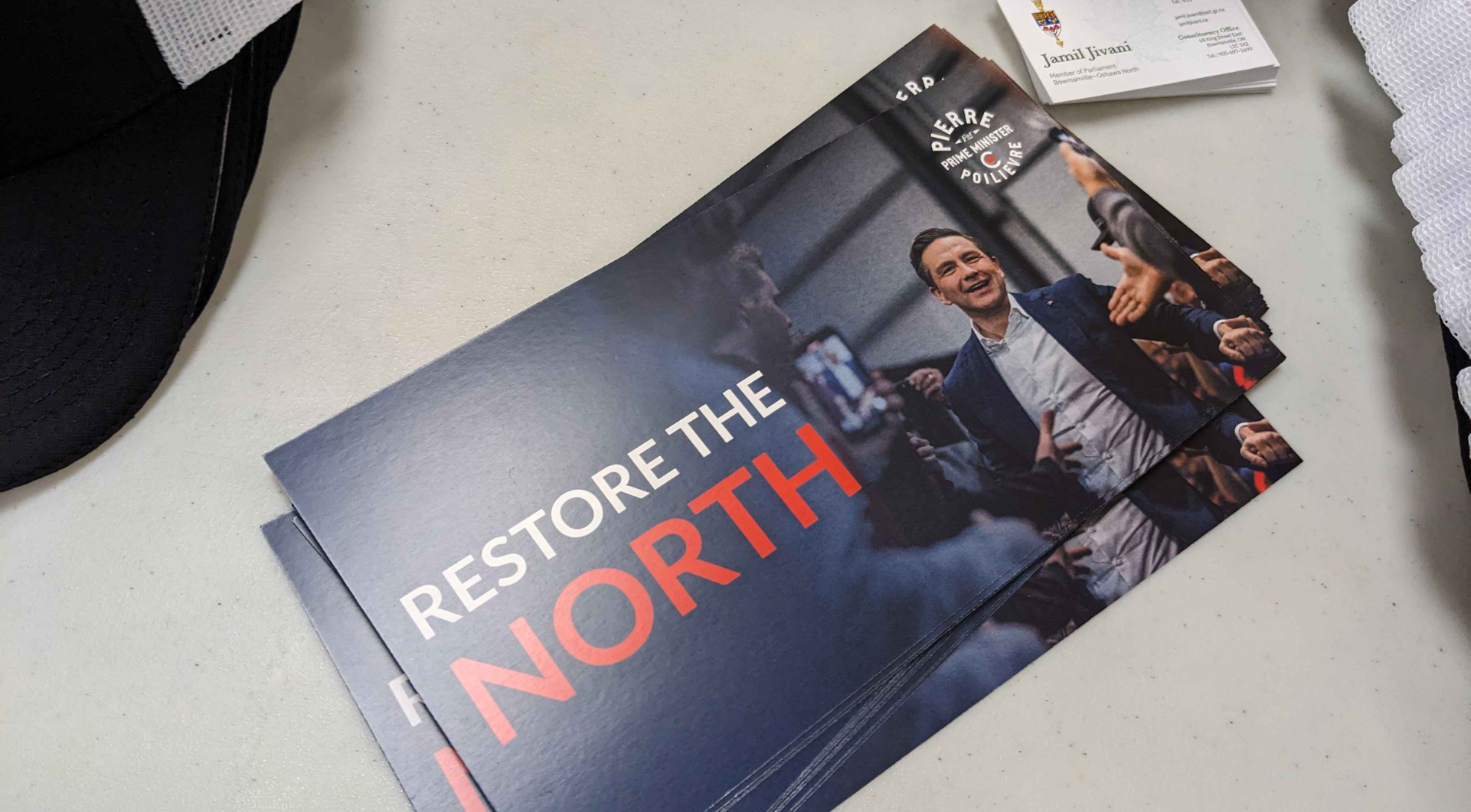
Although everyone—barring that one lady who acted like I'd torched her lawn—was civil, even pleseant, the events energy level was that of a damp washcloth. Half the auditorium looked abandoned, and the crowd was almost entirely male. Maybe the Friday night timing didn't help, but if your movement can't compete with pizza and TikTok, that's not a scheduling issue, it's an enthusiasm problem.
I wanted to believe this would be different. I had genuinely hoped that Jivani was trying to build dialogue, to actually listen to people, and maybe even push his party toward something resembling growth. I didn't walk into that room looking to dunk on anyone. If anything, I wanted proof that the Tories were capable of self-reflection, that they could handle the tough questions without defaulting to the same stale talking points we've all heard a thousand times.
But that's not what this was.
I can;t speak for what happened at the events held at Redeemer, or Guelph, or UofT Mississauga. Maybe those were open, honest conversations. Maybe they were everything this one pretended to be, but I can't speak to that, I wasn't there. I can only speak for what I witnessed at TMU, and what I saw was a scripted showcase, designed to look like engagement without ever actually allowing it.
Which is tragic, because the people who showed up were smart. I talked to several of them afterward, and there were students in that room with sharp insights, thoughtful questions, and a genuine desire to challenge and be challenged. The kind of people any political movement should be thrilled to engage with.
But the Conservatives on that stage didn't trust them enough to let them speak.
No follow-ups. No real dialogue. No willingness to have their ideas tested.
If your message can't survive an intelligent question from a university student without being tightly moderated and wrapped in bubble wrap… then your message isn't strong enough to reach people outside your echo chamber at all.
That's why Jamil and company don't resonate. Not because the audience is “too liberal,” not because people “just don't get it,” but because when given the chance to prove they could rise above slogans and actually connect, they chose control over conversation.
And when you silence the very people you claim to want to reach, you don't win converts, you just insult them.
The views expressed in this piece are those of the author and do not necessarily reflect the editorial position of The Provincial Times or Left Lane Media Group. Read our Content Policy here.


